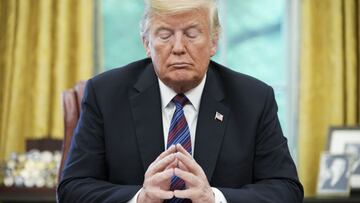Second stimulus check: can Trump refuse to sign a new coronavirus support package?
The CARES Act provided $1,200 checks but Pelosi and Mnuchin have struggled to agree on a new bill and hopes of another round of payments are fading.


American politics is in a strange period of uncertainty at the moment. On the one hand, Donald Trump is still President until 20 January 2021 and Congress is still split, with a Republican-led Senate for now and the Democrats retaining control of the House of Representatives.
But the election has changed the focus with President-elect Joe Biden and his team readying themselves for the presidency while Trump fights furiously against the result. Both parties are preparing for two vital Senate run-off elections in early January that will decide who controls the Senate. Amongst all this, millions of Americans are in desperate need of a second covid-19 economic relief bill that has fallen flat in recent months.
Stimulus package delay "foolish," "country is out of patience"—Congressman https://t.co/sj8dz9d6Md
— Newsweek (@Newsweek) November 12, 2020
If a second round of stimulus checks is to be agreed before Biden’s inauguration it will take major compromise from the two main parties, but could Trump simply refuse to pass the bill?
Could President Trump refuse to sign a new coronavirus support package?
Up until the 20 January 2021, Donald Trump is the President of the United States. He has lost his re-election attempt and even if he were to suddenly concede the race to Biden, he would retain all of his presidential powers until inauguration day. So put simply: yes, he is within his rights to refuse.
During the period between an election defeat and the President-elect taking over, the incumbent president is known as a ‘lame duck’ president. His power to negotiate and find compromises is greatly reduced because everyone is aware that he will soon be departing the office. Trump was struggling to draw concessions on the second stimulus bill even before the election, hamstrung by Senate Republicans’ refusal to come close to the $1.8 trillion package that he was looking for.
.@RoKhanna to @jonathanvswan on whether he would urge Nancy Pelosi to accept a $1.8 trillion stimulus proposal, which she previously rejected from Trump, post-election:
— Axios (@axios) November 10, 2020
“I think we would definitely want to make the deal. And it's gonna be catastrophic if we don't.” #AxiosOnHBO pic.twitter.com/5GcxKE4EL1
In addition to that, if he is serious about continuing to fight the election result in the courts that will likely take up a lot of his and his team’s time. Even before the election, he instructed Steven Mnuchin, his Secretary of the Treasury, to stand down from stimulus negotiations to focus on rushing through the confirmation of Amy Coney Barrett to the Supreme Court. If he continues to focus on his re-election attempts, the chances of another large stimulus package under his leadership seem pretty remote.
Will the Senate refuse to pass another bill?
When Donald Trump tried to get a new stimulus package passed in the build-up to the election his own party proved the biggest obstacle. Senate Majority Leader Mitch McConnell refused to go above the $500 billion ‘skinny’ bill passed by Senate Republicans, a huge gap to the Democrats’ $2.2 HEROES Act which passed the House months earlier.
Speaking on Tuesday, McConnell made pretty clear that he does not expect there to be any movement: “It seems to me that snag that hung us up for months is still there. I don’t think the current situation demands a multi-trillion-dollar package. So I think it should be highly targeted, very similar to what I put on the floor both in October and September.”
Do not expect a new stimulus proposal from the White House, per person familiar
— Jeff Stein (@JStein_WaPo) November 6, 2020
Mitch McConnell now in lead on GOP stimulus strategy
McConnell is expected to advance a "skinny" package -- which has been DOA with House Dems -- with the administration's blessing
That “targeted” package he mentions did not include any stimulus checks, so it would require a pretty staggering change for a new wave of Economic Impact Payments to be sent out to Americans before January.
Is there another way to get a round of stimulus checks passed?
Related stories
Most experts are expecting a legislative logjam until the Georgia Senate run-off elections are held on 5 January. As it stands, the Senate majority is still undecided with the two available seats enough to flip the Upper House for the Democrats. If they are able to do so, Americans can expect a generous stimulus bill to be signed into law soon after inauguration day. If not, Senate Republicans will probably continue to vote against anything too far-reaching, meaning that stimulus checks are unlikely.
Voters split on candidates in Georgia Senate runoffs: poll https://t.co/5sRHoy9BYf pic.twitter.com/Z0Ff8SkiLc
— The Hill (@thehill) November 12, 2020
One more left-field solution could be to include stimulus checks in the government funding bill that is due to be passed in December. This piece of legislation will set the 2021 government budget and includes major areas of spending like defence funding and homeland security. It may be possible for a reduced number of Economic Impact Payments to be included in this bill to support those hardest-hit by the pandemic. But for now, hopes of a repeat of the stimulus checks provided for in the CARES Act seem to hang on the result of the Georgia Senate race.

